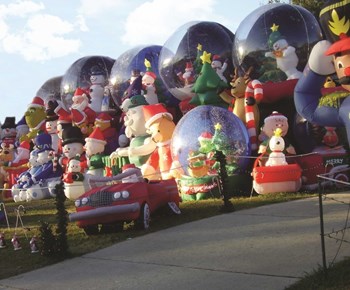
In an episode of the television classic, “Seinfeld,” George Costanza’s father (played by Jerry Stiller) invents “Festivus—for the rest of us” to mold all the holidays into one event. Attorney Frank Lombardi of the law firm of Goodman, Shapiro & Lombardi, LLC in Lincoln, Rhode Island, jokes that Costanza’s concept might diminish conflicts within communities. But in the real world, there’s no escaping Christmas. This holiday, the biggie of them all, tends to create the most fuss among condo residents, as childhood fantasies and religious intentions collide with “the rules.” The associated holiday “cheer,” as expressed in flashing lights and inflated Santa figures, creates problems for board members.
Keith Shirley of Meridian Realty Group in Boston, which manages about 1,600 residential condominium units, says most boards put rules in place to define just what will, or won’t, be allowed to deck the halls.
Boards would do best to establish regulations and enforce them, he says. “It’s really dependent on trustees what the rules and regulations are. Smaller, more intimate residences—and even the long-term urban residential areas—seem to have kind of an understanding about the holidays, and people hold a collegial relationship with each other. But on any new building we take over from the developers, we set up rules and regulations, and we highly recommend that the board of trustees adhere to them.”
Why? Any mother of multiple children can tell you that.
“If you let one go, everyone else starts to do what they want,” Shirley said. “Enforcement becomes difficult from a management perspective.”
The Rules vs. the Law
If a board wants to restrict decorations, it has to be in the bylaws—not just the rules, says attorney Frank Flynn of the law firm of Downing & Flynn in Boston. “If you’ve got one unit where they go all-out on lights and signage and everything, and the condos are all built to look uniform, maybe you want to say ‘no sign or decoration bigger than two by two feet,’ or something like that. Condo operators can set up any kind of condo they want, and the condo documents can put forth restrictions on the freedom of owners to do what they want to do in and around their condo units. In Massachusetts, the restrictions that appear in the deed or in trust bylaws are generally enforceable against the unit owner.”
Finding Common Ground
By itself, a rule won’t be enforceable in regard to the inside of units, thus the need for a bylaw. The condo board has to do its work first, however. “The trustees need to enact a bylaw if they have none,” Flynn said. “Most condo trusts require a vote to do that, and they’ll need to get 67 percent of the vote of unit owners, or a similar figure.”
He advises that trustees seeking a new bylaw do their homework first: “Do some education about it; talk with people—that always helps. Getting the majority to vote for ir is not easy. Sometimes, you can’t even get a quorum to show up at an annual meeting. So if you’re going to pass a new bylaw that says no decorations, you may see some opposition.”
“There’s another school of thought that says, ‘Jeez, just restrict the size.’ They don’t want to be in court over it. Whatever you do, you have to make sure to treat everybody the same. Suddenly coming down on another faith or culture is going to cause problems. If you’re a condo association letting people put up lights and trees and Santas and statues, a manger, etc. and then somebody wants to put up a menorah, and you selectively say, ‘Oh, we’ve got this no-signs policy and you can’t put that up. Or say it’s a Muslim symbol, etc., you can’t selectively enforce it. You’re going to have problems.”
Lombardi echoes Flynn’s statement. From a legal standpoint, consistency is key. If an association wants to make rules—and some do not—he advises this: “It has to be uniform. If you’re going to say, ‘We want to be plain vanilla,’ it has to be applied to everybody.”
And that, Lombardi says, is tough to enforce. Sentiment clashes with reason when it comes to holidays. “People have families coming, with grandchildren and such, around Thanksgiving and they want to put up their Christmas decorations then.”
That makes for a long season, and disputes may arise from those who don’t want them. “It’s a moving target, so you have to use your common sense,” Lombardi advises boards. “Allow it for an appropriate period of time—or say nothing at all.”
Saying nothing appears to be commonplace in Rhode Island. Lombardi says Rhode Islanders tend to accept abundant expressions of holiday mirth on doorways, patios and windows. He concludes that’s because of the state’s largely Roman Catholic heritage.
“Rhode Island is a very ethnic state; there are a lot of Italians and Portuguese, a lot of Hispanics, which has a heavy influence,” Lombardi says. “There’s a lot of decorating that is religious in nature; it’s not just Santa Claus.”
Consequently, his office doesn’t get a lot of questions about freedom of religion vs. condominium ambiance. “It hasn’t come up,” he said.
That’s interesting, considering the state’s municipal battles, one of which extended to the Supreme Court. In 1984, the high court ruled (5-4) that a mixed display of religious and secular holiday décor on public property in Pawtucket to be constitutional. The court cited “historical” significance as the meaning behind the display, rather than a government-led effort to promote Christianity, as was being argued. “We’d all like to have separation of church and state,” said Lombardi, “but when it comes right down to it, it’s ‘not in my house,’ usually.”
Bottom line: It’s a trustees’ decision, and sometimes they permit holiday displays out of a ‘go along to get along’ mentality, adds Shirley. “You don’t want to make the place unfriendly, but you don’t want residents to run amok. So it’s up to trustee discretion. Usually, there’s quite a bit of leeway, depending on the association.”
Levels of Tolerance
If it’s a refined holiday spirit they want to express, boards have found ways to do it without permitting individual displays, Shirley adds. “For a downtown building, 20 to 30 garden-level units, brownstones or something, there’s not a lot of tolerance for decorating. Maybe they’ll do some seasonal plantings around the holidays, but not allow anything in the hallways or common areas. People may express the seasons through their windows, but in historic districts, there may be restrictions even on that.”
Interestingly, Shirley says Halloween tends to slip through the cracks. “With it being a children’s holiday, they’re often more lenient.”
For the most part, experts say decorating disputes don’t boil down to religious intolerance questions. People have to realize that when they move into a condo community, there will be rules that govern overall appearance and activity. And they do. Complaints involving décor stem from what some call “tacky” intolerance. Lighting displays are the worst offenders. Flashing, running or poorly mounted, they can be just plain difficult for others to live with.
John Thiboutet of The Niles Company in Cambridge, says holidays like Chanukah, Halloween, or Kwanzaa don’t raise many hackles, but Christmas goes over the top—and those who like decorating are as adamant about it as those who don’t.
“Typically, we do have rules about decorations in the common area; windows and balconies are usually big (areas of contention); people put decorations on them, and all of my associations have limits on them. One says, for example, you can have holiday decorations—but only for two weeks.
One Niles-managed property has a rule that spells it out: “Holiday decorations are permitted on balconies and doors, but must be taken down two weeks after the holiday. No decorations are allowed on the lawns, bushes, trees, or any other common area that is deemed inappropriate by the Board of Trustees.”
Disputes arise—and the wise board has a policy in place to deal with them, he says.
“People have problems with not being allowed to decorate the way they want, but the answer is, ‘you live in a condo and there are rules, and people just have to abide by them.’ They’re typically warned first, and then fined if they don’t comply with the warnings.” Some associations are so absolute about the rules that they will fine a resident daily for infractions; others use a fine as a weekly reminder to take them down, says Thiboutet.
The courts have stood on the side of association rules, refusing to reduce the disagreement to a matter of religious intolerance, says Flynn.
“In 1996, in Massachusetts, there was a Superior Court case, Devine vs. Fischer, in which the unit owners wanted to put up holiday decorations and the condo trust said, ‘Wait a minute, that’s a violation of the trust bylaws. You can’t be doing that.’ So the superior court said, we agree with the trust. If there is a ban in the bylaws, it’s not a violation of free speech. Basically, the unit owners knew when they bought the unit that there was this restriction. The bylaws said the architectural integrity of the building units shall be preserved without modification.”
“A condo is not the government, not the state. A private entity is not part of the government—so you don’t have any state action to bring up a constitutional claim,” he says.
In 1983, in the case of Franklin vs. Spadafora, justices reiterated the argument. “Under Massachusetts law, there can be restrictions on the use of units,” says Flynn. “They said, ‘these prohibitions were in place when you bought.’ The bylaws and master deed are recorded, so they had notice.”
In any case, the problem generally goes away with the holidays.
“You typically have rule-followers, who begin to report these things if decorations are not down within two weeks, especially in some of the larger communities,” Thiboutot says. “And when you have 200 people, you usually have a few like-minded people on the subject. That’s condo living.”
Just what rules should be in place is as dependent on the board as residents, and there are times the managers have to step in to settle disputes on both sides.
“There are two properties in Boston that don’t allow decorations at all,” Thiboutet says. “There are no balconies, so they don’t allow anything on the doors or in the windows.” Is it religious or ethnic intolerance? He doesn’t think so. “I feel as though they think it’s tacky, and they don’t want to detract from the building’s appearance.”
People in a shared housing situation have to conform to some restraints.
“If there’s a rule, we go by the rule,” Thiboutet says. “One of my boards wasn’t sure what to do, so we sat down, the board and myself, and tried to hash out what they were looking for—what were the complaints they were getting, how harsh did they want to fine—and came up with a rule for where and for how long people could put up the decorations and it seemed to work well. The real problem is when you have a Christmas decoration up and it’s July!”
Ann Connery Frantz is a freelance writer and a frequent contributor to New England Condominium.






Leave a Comment